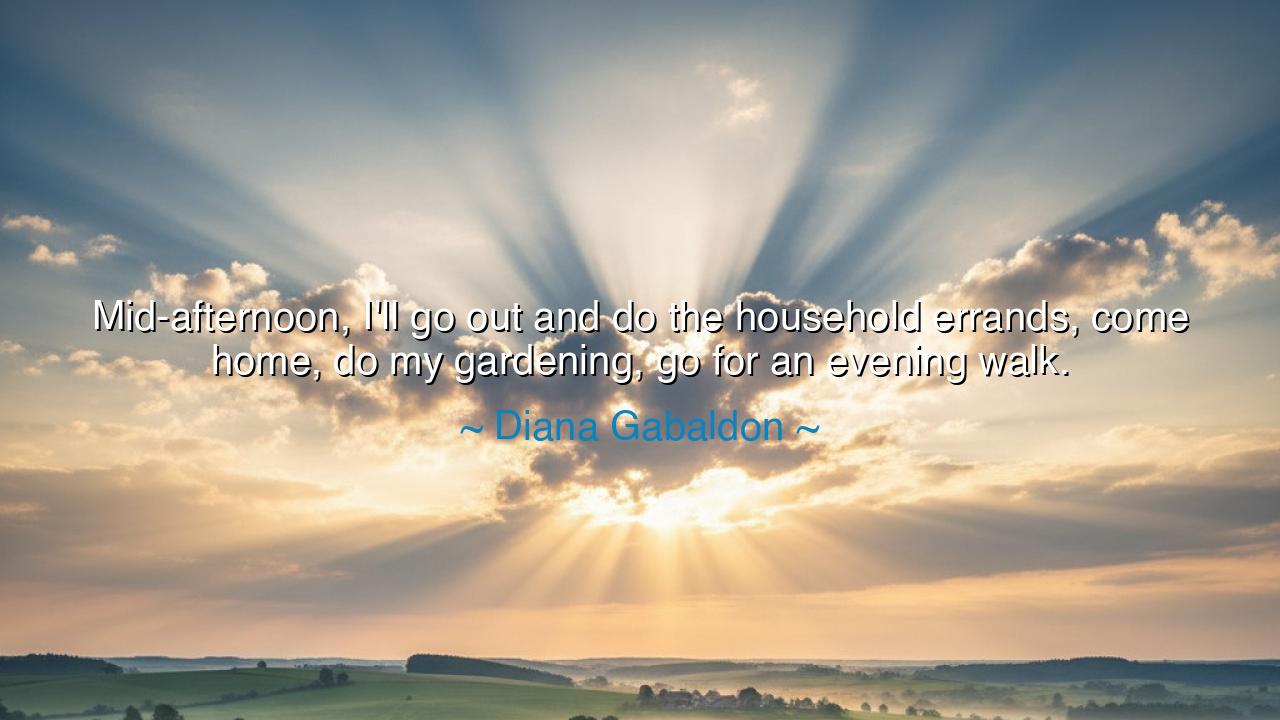
Mid-afternoon, I'll go out and do the household errands, come
Mid-afternoon, I'll go out and do the household errands, come home, do my gardening, go for an evening walk.






“Mid-afternoon, I’ll go out and do the household errands, come home, do my gardening, go for an evening walk.” — in this calm and unhurried rhythm of words, Diana Gabaldon, the renowned author of Outlander, reveals not only the pattern of her day, but the quiet philosophy that guides her life. Beneath the simplicity of her statement lies a truth of great depth: that peace is not found in grand achievements or fleeting triumphs, but in the steady cadence of balance, routine, and presence. Hers is the wisdom of one who understands that life, to be truly lived, must be paced like the turning of the seasons — active yet restful, productive yet reflective.
The origin of this quote comes from Gabaldon’s reflections on her creative life. Known for weaving vast, time-spanning tales of passion and adventure, she grounds her imagination in the ordinary rituals of her day. Between the sweep of history and the roar of fiction, she returns to the tangible — to errands, to gardening, to the quiet act of walking beneath the open sky. In this balance between the world of words and the world of soil, Gabaldon finds her center. Her daily rhythm becomes a meditation on harmony — a lesson that even amidst creation and chaos, the spirit must anchor itself in the simplicity of motion and the stillness of nature.
To say, “Mid-afternoon, I’ll go out and do the household errands,” may seem mundane to those who seek grandeur, but it is the mark of a disciplined soul. In every era, the wise have known that order in the outer life brings clarity to the inner. The philosopher Marcus Aurelius spoke of doing each duty “as though it were the last,” with attention and calm. So too does Gabaldon remind us that no task is too small to hold meaning. To walk among the errands of the day is to practice humility — to remember that greatness is built not from isolated moments of brilliance, but from the steady accumulation of ordinary faithfulness.
And then she says, “Come home, do my gardening.” This is not mere leisure; it is communion. To garden is to converse with life itself — to touch the pulse of creation with one’s hands. Gabaldon, whose imagination has given life to entire worlds, turns to the earth to be reminded that all creation begins in stillness and labor. Each seed she tends becomes a metaphor for the stories she writes: both must be buried, watered, and patiently waited upon. The gardener and the writer share the same virtue — the courage to trust the process, even when nothing yet blooms. Gardening, for her, is the holy pause between motion and meaning.
Then comes the evening walk, that act of sacred solitude that humanity has practiced since time began. The walk is the moment when body and mind find their rhythm again, when the noise of the day gives way to the soft whisper of reflection. Many of the world’s great thinkers — from Aristotle to Thoreau — found wisdom while walking. In those simple steps, the heart opens, and the thoughts that have tangled in the day unravel. Gabaldon’s words remind us that walking is not escape, but renewal — a way to move gently between the worlds of duty and dream, of labor and love.
There is also in her words an implicit understanding of harmony with time. She does not rush; she flows. Her schedule is not ruled by frenzy, but by rhythm — a rhythm that honors the body, the mind, and the earth. This is a way of living that our modern world, driven by speed and noise, has nearly forgotten. To live as Gabaldon lives is to reclaim the lost art of presence — to know that life’s beauty does not lie in doing more, but in doing what one must with care, and then returning to the self through the quiet companionship of nature.
History, too, gives us examples of such balance. Leo Tolstoy, after long hours of writing, would retire to his fields, working alongside peasants, his hands in the soil. There, he found truth — not in philosophy or fame, but in the earth’s slow and honest rhythm. “There is nothing stronger,” he said, “than those two: patience and time.” Gabaldon’s afternoon errands, her gardening, and her evening walks carry that same eternal spirit — that the soul must both act and rest, give and receive, labor and listen.
So, my child, take this lesson into your own heart: seek not only success, but balance. Build a life that moves with grace — one that honors both work and rest, creation and stillness. Let your mid-afternoon be a time to step away from the noise and touch the ordinary joys that sustain you. Do your errands with mindfulness, tend your garden — whether of flowers, of dreams, or of relationships — and walk each evening beneath the fading light to remind yourself that the world, for all its chaos, still turns in peace.
For in those small, faithful acts — in errands done, gardens tended, and walks taken — lies the secret of a life well-lived. Diana Gabaldon teaches us that the true art of living is not in seeking the extraordinary, but in finding eternity within the ordinary. And when one learns to move through each day with such quiet rhythm, then even the simplest afternoon becomes a song — a hymn to harmony, patience, and the deep, enduring grace of being alive.






AAdministratorAdministrator
Welcome, honored guests. Please leave a comment, we will respond soon